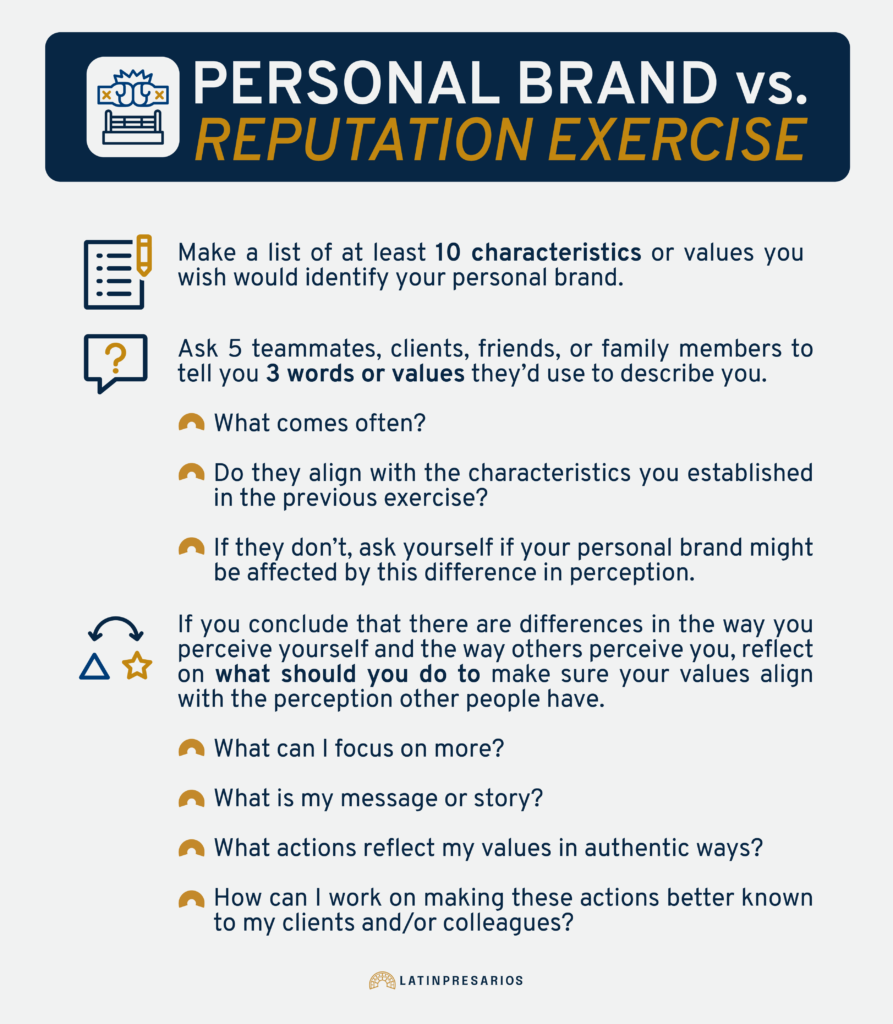The main difference between your personal brand and your reputation is that you control your personal brand, while your reputation is influenced by the opinions of others, which you don’t control.
A personal brand is a combination of several components. The way you portray yourself, your achievements, and the thoughts and emotions that arise when your name is mentioned are all parts of your personal brand.
Your personal brand is the result of conscious efforts to build a professional reputation. Your actual reputation is a component within your personal brand.
Another distinction between the terms is that while personal branding is a planned and carefully thought out operation, reputation management is more volatile, unpredictable, and an ongoing feedback analysis and response process.
In this article, we will explore:
- The ways in which crafting a personal brand can differentiate from managing your reputation
- Insights on how you can plant the necessary seeds for a good reputation
- Where to put your focus on when faced with the “personal brand vs reputation” problem
Make sure to check out the exercise we share at the end of the article, which you can do to improve both your personal brand and your reputation!
Contents
Personal brand vs reputation: the key difference
The main difference is who is in control of each one.
A personal brand, the result of your personal branding process, is within your control. It is your identity and its expression.
On the other hand, reputation is how people perceive and react to your personal brand. Reputation is influenced by others’ opinions of you and by people’s reactions to your actions.
It is harder to be in control of your reputation.
You cannot always be in control of how people feel about you.
However, it is important to address how you can influence your reputation from your personal branding process, and this is where some of the main similarities between personal brand and reputation shine.
This way, the personal brand vs reputation main differentiating point comes down to who is in control of each.
As Jennifer Bridges established in her article:
“Both strategies aim to increase your authority in your area of expertise. Personal branding achieves this by making you more recognizable as a trusted resource. Online reputation management does the same thing by highlighting the positive search results about you and diminishing the negative ones.”
Generating a positive reaction is part of the process and objectives of both developing a personal brand and managing a reputation
That is why it is important to take into consideration what it takes to master these two processes simultaneously.
Therefore, sometimes the best way to settle the personal brand vs reputation debate is by acknowledging that both complement each other.
Identify your values
Identifying your core values is one of the most important aspects of any personal brand discovery process.
Similarly, one thing people sure will be able to discern in you is whether or not you have values and if you follow them consistently.
At the end of the day, your values are key elements of your personal brand and reputation.
They are a moral compass that will guide how you express yourself and your decisions.
Keeping track of your personal brand values
Once you have identified your core values, you should be able to show them through your actions.
If you do not manage to consistently act in such a way that you practice these values in everything you do, people will notice.
And beyond people noticing, your lack of consistency will surely affect your personal branding process and probably the other projects you might have going on.
This is not to say that you constantly need to pander to what others expect of you, but rather that your ethics and morals should be something that goes beyond speeches.
The point is, identifying and practicing consistently your values is an important part of any process, and paying attention to that guarantees a more stable path to success.
Personal brand vs reputation: Which one would you value more?
Practicing self-awareness
Self-awareness is one of the first things people notice in someone who desires to become a leader. But more than that, it is also a key factor for success.
Being able to revise your actions through different perspectives and notions can go a long way in almost every goal you set for yourself.
This is why it is important that you find ways to gain information and feedback on how you are being perceived by others, and if that is how you have been trying to be perceived.
If you find out it isn’t, then it is time to find answers for why there is that disconnect between your intentions and the public perception.
We are all humans, which means we are inherently flawed and imperfect.
However, recognizing that and accepting the constructive criticism needed to understand how to become a better version of yourself is the way to succeed.
On both sides of the personal brand vs reputation discussion, you would enjoy the benefits of practicing self-awareness.
Managing a personal brand is still managing a brand
Remember that you should be able to put yourself in the shoes of your audience and the other members of your team, even if the brand discussed is your identity.
No company, project, or goal has been achieved without recognizing mistakes and improvements to be made along the way.
Identifying your audience’s needs
In order to become a thought leader, it is necessary to provide valuable contributions in your niche.
There is no personal brand vs reputation problem, if no audience influences and is influenced by either.
This is why it is so important to identify your target audience and understand their needs and problems. This way, you are able to make content that speaks to them.
This is what we consider a part of the branding strategy phase, where you determine how you can most cultivate positive reactions in your audiences through strategic planning and research.
In a way, identifying your audience’s needs and finding how to satisfy them is part of both personal branding efforts and reputation management work.
If you are interested in knowing more about what Latinpresarios offers in their personal branding strategy services, click here.
Manage public perception and branding intent
Managing public perception is something that, in the last couple of decades, has become more and more relevant, both from a business and social standpoint.
If you want to learn more about personal brand management services, check out our article on it.
The ways people have found to connect with each other and communicate have changed how we perceive the world and ourselves.
In terms of the debate around “personal brand vs reputation,” we need to address the different forms in which reputation management work.
Also, how personal branding endeavors try to solve the problems that arise with the rise of social media use and the need for public relations administration.
“Online” reputation and “real” reputation
In order to begin to understand what are the right ways to improve both your personal brand and your reputation, it is important to know the distinction between “real” and “online” reputation.
“Online” reputation would be the opinions and impressions that arise from your digital print on the internet.
These thoughts and impressions can come from both the things you post and the things posted regarding you.
On the other hand, a “real” reputation would be the thoughts and impressions that people might form of you from your behavior and appearance that they get from you outside the internet.
They can come from any in-person encounter, how you present yourself in work, school, family, and basically, any social setting that is not necessarily created online.
However, it is important to note that your “online” reputation can almost always affect your “real” reputation and vice-versa.
Improve your public perception through personal branding
There is a lot of value in being the first one people find when looking for a solution to a problem.
Also, there is even more value when the reviews regarding those first results are positive.
Before the internet, becoming the number one option for a service or inquiry was a subjective process.
It was limited to word-of-mouth recommendations, dominating the print media and television and restricted by your context’s geographical and physical boundaries.
In other words, personal branding was way more difficult.
Now, the story for many professionals, entrepreneurs, and academics is very different from the possibilities that come from social media, search engines, and the digital world itself.
New ways to let people know you and your capabilities are easily accessible online.
And with these new ways, more objective forms of ranking in your niche are achieved.
Managing someone’s public perception becomes a work of trying to make sure that the first things that appear online when anybody searches for their name are positive.
It is also an effort to make sure that in every problem and topic that a specific audience might research, your name comes up associated with the solution.
That is what personal brand marketing does, which inherently has an element of reputation management.
Wondering how this fits the personal brand vs reputation debate?
Well, by improving your public perception through personal branding, you would also be working on your reputation!
Align your real and online reputation
As Guillen Recolons establishes, “a person can enjoy an excellent real reputation and a bad online reputation”.
“a person can enjoy an excellent real reputation and a bad online reputation”
According to Recolons, some of the reasons might be:
- Digital absence: when someone doesn’t make an effort to be present on the internet, it affects the potential to have a good reputation online and leaves it to the mercy of anyone who speaks about that person.
- Wrong digital protocol: applying a bad strategy to position yourself as a leader and a good reference in your area of expertise.
- Wrong story: only doing self-promotion while not knowing how to market oneself properly. This also comes from focusing too much on oneself, which leads to an impression of “bragging.”
The solution? Try to engage and demonstrate capability.
Becoming a leader requires work and effort.
And that is why it is important to cover as much ground as you can, both in the real world and in the online world, in order to have the visibility and support needed to be the go-to leader in your niche.
In the previously mentioned factors, regarding having a disconnect between someone’s online and real reputation, a very important message can be found:
Achieving a good reputation is a matter of consistency, strategic thinking, and good marketing.
In these things, personal branding shines as the most accurate discipline to work on them.
Are you struggling to match your personal brand and reputation the way you want to? Check out this exercise:

The stakeholders of a personal brand
A personal brand is still a brand, so it is worth identifying your stakeholders.
To have a better reputation while improving your personal brand, it is good to remember that your potential or actual clients are not the only people whose opinions are worthy of consideration.
Therefore, managing both sides of the “personal brand vs reputation” issue.
This is why the concept of “stakeholder” comes into play because it refers to all those who might be affected or have an influence on your brand.
These stakeholders can be presented in different ways. They tend to be people who work with you or for you and are allies in your journey to your goals.
That said, these are some of the things you should consider to take into account your brand stakeholders:
- Cultivate relationships and network within your niche.
- Keep in mind that your reputation is not limited to the perception of your potential customers or clients. It is also subject to what your colleagues, associates, mentors, providers, and employees see in you.
- Be aware of them in the branding process. Any of these actors play a role in the construction of your reputation, as they are key in the path to having a good one.
How much should I care about my reputation?
As discussed in this article, there can be ways to identify the differences in the personal brand vs reputation debate.
However, within these distinctions, it is possible to see how these processes complement each other.
Also, how they are subjected to consider others for anyone to maximize the chances of becoming a leader and having a good reputation.
Caring about what others think of you can be intimidating, since sometimes it is just outside of our scope of influence.
But, you can find balance in creating a personal branding journey that is authentic, purposeful, and self-aware.
And as long as you stay connected to your values and take others into consideration in a humble way, you are well on a path to success.
At the end of the day, having a good reputation will always have more benefits than downsides.
After reading this, which one do YOU think wins in the personal brand vs reputation divide?
Are you ready to begin or take to the next level of your personal branding journey? Do not hesitate to contact us here at Latinpresarios.






